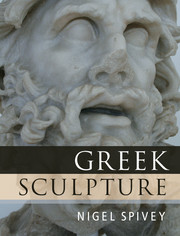Book contents
- Frontmatter
- Dedication
- Contents
- List Of Figures
- Preface
- Note
- 1 Introduction: the Study Of Greek Sculpture
- 2 The Greek Revolution
- 3 Daedalus and the Wings of Technê
- 4 Anathêmata: Gifts for the Gods
- 5 Heroes Apparent
- 6 Temple Stories
- 7 In Search of Pheidias
- 8 Revealing Aphrodite
- 9 Royal Patronage
- 10 Portraits and Personifications
- 11 Graecia Capta
- 12 Afterlife
- Index
11 - Graecia Capta
Published online by Cambridge University Press: 01 December 2014
- Frontmatter
- Dedication
- Contents
- List Of Figures
- Preface
- Note
- 1 Introduction: the Study Of Greek Sculpture
- 2 The Greek Revolution
- 3 Daedalus and the Wings of Technê
- 4 Anathêmata: Gifts for the Gods
- 5 Heroes Apparent
- 6 Temple Stories
- 7 In Search of Pheidias
- 8 Revealing Aphrodite
- 9 Royal Patronage
- 10 Portraits and Personifications
- 11 Graecia Capta
- 12 Afterlife
- Index
Summary
To plunder was an ancient right of war. Modern instances are not unknown – the British in Africa and China during the nineteenth century, Germans and Soviets during the Second World War – but these have been more in the nature of targeted reprisals. The original logic lay rather in the consequence of martial success. Taking an enemy's most cherished objects of self-definition and collective esteem was a symbolic act of incorporation, or – to put it more strongly – digestion. As victors of certain tribal disputes are said to make cannibalistic meals of the defeated, so the carrying-home of prize possessions may be thought of as a sort of predatory feast. Ceremoniously, the enemy is ‘eaten up’.
This makes a rather crude overture to a chapter about the Roman assimilation of Greek sculpture, which – as already intimated – was a complex historical process, subject to increasingly sympathetic modern study. There was a ‘cultural revolution’ that accompanied Rome's dynamic growth from a pastoral settlement on the banks of the Tiber in the seventh century BC to domination of the Mediterranean and beyond when Hannibal's Carthage was destroyed in 146 BC: as we shall see, Greek sculptors were at work in Italy since the very beginnings of Rome as a cit y. Yet the narrative of plunder was how the original writers of Roman history chose to describe the ‘reception’ of Greek sculpture in Rome – as the rightful spoils (spolia, or praeda) of conquest. So let us start with that tradition.
A passage in Livy dramatizes the turning-point as the aftermath of the capture of Syracuse by the Romans in 211 BC, when the victorious general, Claudius Marcellus, as Livy is careful to record, ‘came to a settlement, throughout Sicily, with such good faith and integrity that he increased not only his own glory, but also the respect for the Roman people’. Livy proceeds more sternly: ‘But as for the ornaments of the city [ornamenta urbis] – the statues and paintings with which Syracuse was loaded – these he took off to Rome, as spoils of the enemy, rightfully gained by conquest. That was the origin of our admiration for Greek works of art’ (25.40; italics added).
- Type
- Chapter
- Information
- Greek Sculpture , pp. 276 - 299Publisher: Cambridge University PressPrint publication year: 2013



